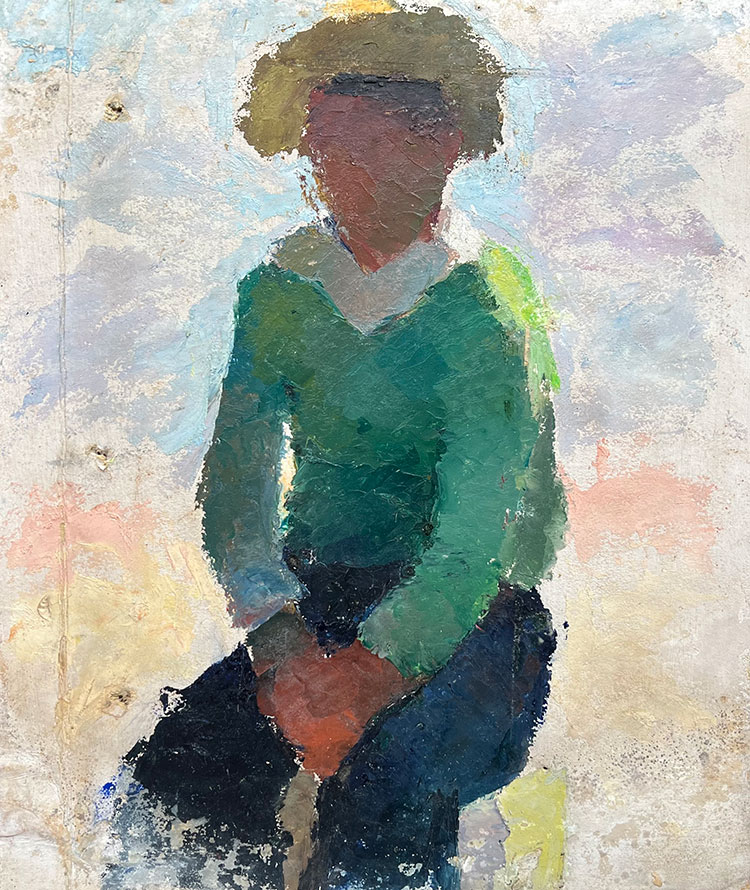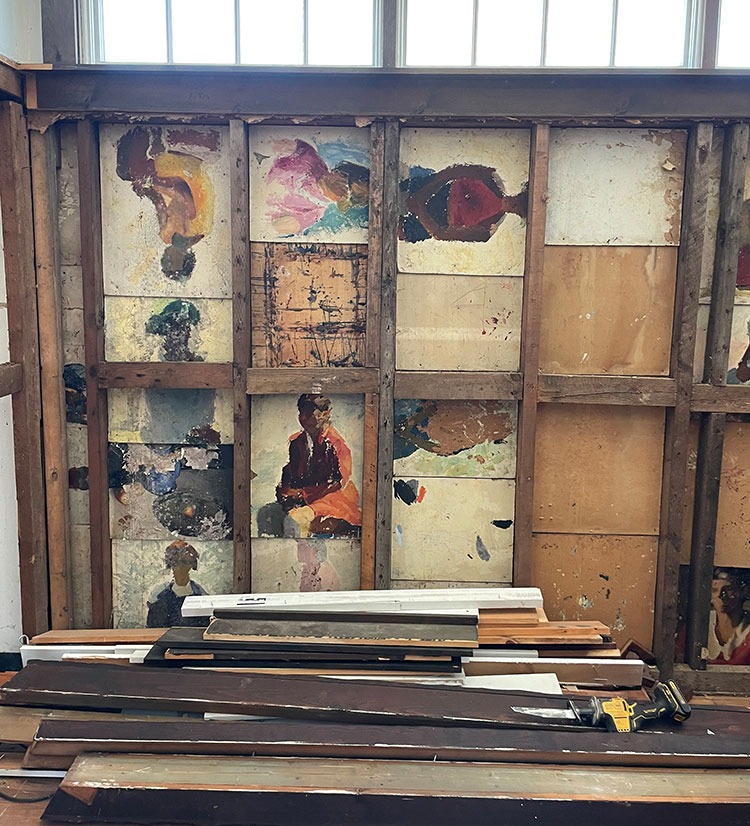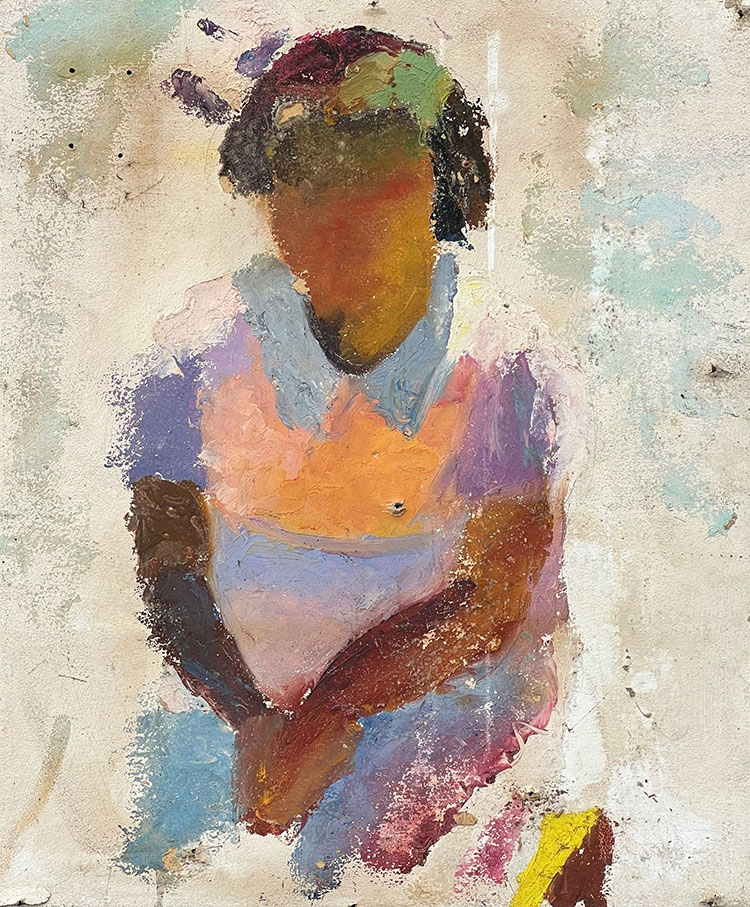
If the Walls Could Talk
Cape Cod Life / September/October 2023 / Art & Entertainment, History
Writer: Leslie Hatton
If the Walls Could Talk

Cape Cod Life / September/October 2023 / Art & Entertainment, History
Writer: Leslie Hatton
Portraits of the past found tucked into the walls of historic homes in Provincetown rock the local art community.

Famed French impressionist artist Claude Monet said, “The real subject of painting is light,” and Charles Hawthorne must have agreed. Hawthorne, an American portrait and genre painter founded the first art school in America, the Cape Cod School of Art in Provincetown in 1889, and was renowned for teaching outdoor figure painting. Hawthorne taught the value of incorporating the natural light as a painting technique, instructing his students to focus on the larger form and avoid painting details. Using palette knives to spread a thick layer of paint as one would spread putty, Hawthorne encouraged his students to paint sparse, faceless forms, which came to be known as Mudheads. Imagine the surprise within the Provincetown art community when several of these paintings from Hawthorne and/or his students were discovered nestled into the walls of old buildings in Provincetown, used as an archaic form of insulation.
Arthur Egeli, artist and owner of Egeli Gallery says, “There was an original discovery in 2005, inside the walls of 23 Brewster Street, which was the original location for the Cape Cod School of Art. When they were remodeling the building, they discovered about 200 Mudheads being used in the walls as insulation. The owner of the house came back from lunch and said he saw ‘all this color’ in the dumpster and that the contractor told him, ‘We keep finding these everywhere!’ Many of those were damaged and needed some restoring, but people were very interested in the find, they sell almost as soon as they’re framed. They’re unique to Provincetown.”
These paintings, mostly done on panels made of a type of pressed cardboard-like material were done by hundreds of students and mostly discarded as they were considered an exercise in technique. Art historian and owner of Julie Heller Galleries in Provincetown, Julie Heller says unlike perhaps many other pieces of art, the Mudheads often weren’t signed by the individual artists/students, as “There was a lot of humility, and this was just a practice.”
Hawthorne would pose his models outside, often at the beach, with the natural light source of the sun behind the subject, facing the artist. This positioning would force the students to concentrate on what Hawthorne was teaching them—focus on form, not details like eyes or mouths, but instead on swathes of color. Egeli says, “You don’t need the facial details to read the story. You can almost see the character of these children and adults who modeled. From their outfit, what they’re wearing, their hairstyle or hat—they appear almost like ghosts of our past.”

One student who was greatly influenced by Hawthorne and his style of teaching was German born artist Henry Hensche. When Hensche arrived in Provincetown by way of Chicago and New York, he painted and learned alongside Hawthorne until the founder’s death, leaving 30 years of teaching behind and big shoes to fill. Hensche continued in the impressionist style and eventually took over the Cape Cod School of Art, renaming it Cape School of Art. Egeli was one of Hensche’s students, as well as a family friend, and remembers “assisting with patching holes in the studio walls with old student work.” Fast forward to 2023 and renovations were being done to 22 Brewster Street, across the street from the original Mudhead finds, but this time in the former studio of Ernest Irmer, a Provincetown sign maker. Egeli says, “Another 40 were found in those walls and this group is a little more special as they were in much better shape. There were only two artists that shared that space, so these likely were Hensche’s.”
Hawthorne’s methods and influence in the plein air style is far reaching and influential to this day. His book, Hawthorne on Painting, is a collection of his notes, compiled from the artist himself as well as from his students, that is still widely sold. Divided into sections such as: outdoor model, still life, landscape, the indoor model, and watercolor, they are Hawthorne’s thoughts and advice to students that resonate with artists 140 years after establishing the school. Gems like: “Anything under the sun is beautiful if you have the vision—it is the seeing of the thing that makes it so,” and, “A sketch has charm because of its truth—not because it is unfinished.”
Heller says of the discoveries, “They were essentially practice paintings done by Hawthorne’s students as they learned how to block and use light and color. As valued as they are to us, because there is beauty in their simplicity as well as their historic value, when they were done, it was with such frequency, and therefore weren’t treasured the way they are now.”
Heller’s Provincetown gallery will feature the discovered Mudheads in a show that runs until September 22nd. She encourages everyone to visit and view these treasures, “There is a palpable energy in their studied light and a sense of discovery in their unfinished quality.” Several Mudheads are also available to view and purchase at Egeli Gallery, also in Provincetown and online at egeligallery.com.
Leslie Hatton is the assistant editor at Cape Cod Life Publications.







